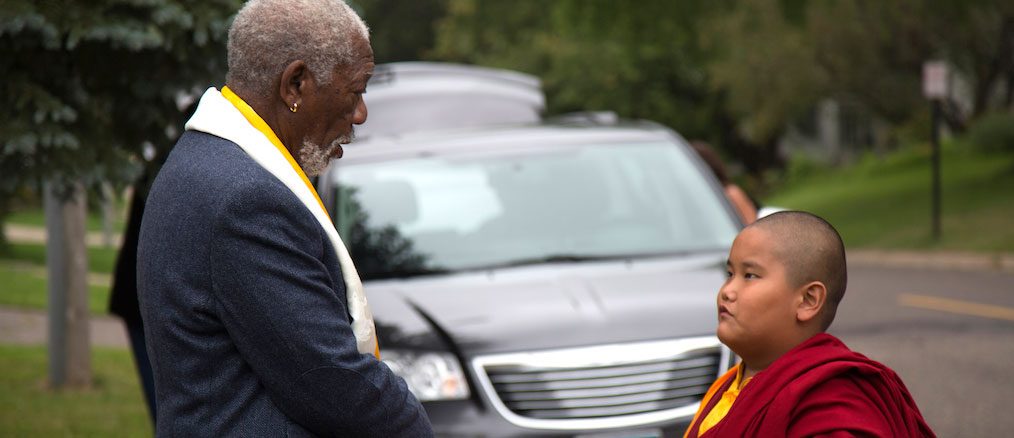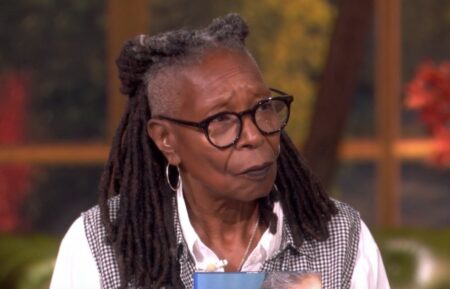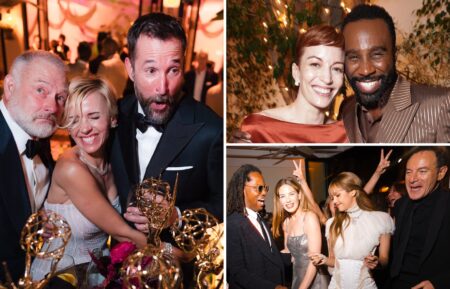Morgan Freeman: Why Our Current Political Climate Makes It The Perfect Time For a New Season of ‘The Story of God’

National Geographic Channel’s The Story of God with Morgan Freeman debuted last April and became the network’s most-watched series ever, earning an Emmy nomination in the process. On Monday night, the visually stunning, deeply moving series returns for a 3-episode second season that will explore “chosen ones,” heaven and hell, and how God’s existence might be proven.
Freeman—whose personal investment in his subject matter and the pleasure he takes in exploring it are thoroughly evident — again traveled the globe meeting with faith leaders, scientists and everyday folks with much to say about the impact of faith in a harrowing world. TV Insider sat down with Freeman and his producing partners James Younger and Lori McCreary to talk Season 2.
Heartening to see not just the Emmy nomination for the first season, but how deeply viewers embraced this series and its subject matter?
Morgan Freeman: It is very gratifying. It’s very encouraging. It encourages us to think that we can go on—we can do more of this sort of thing.
Lori McCreary: The thing that was most satisfying to me was there are so many clergy and individuals who represent the face that we represented in our show that were honored and thought that they were well represented. Even in the subjects that might be difficult to speak about, they felt that we really looked at it from their perspective. That heartens me.
James Younger: There’s a tendency amongst the non-religious segment of society to look down upon people of faith as being more primitive, less evolved, less thoughtful. What I was gratified to see was people who are unfamiliar with that segment of society were suddenly like, “Oh. I see how important religion is, both to people and to the world and to the way we get along” from an educational point of view and an understanding for encouraging understanding between polarized groups.
Given America’s current social/political upheaval, is it particularly gratifying to offer such a vast audience a show that’s about goodness, hope, and the interconnectivity of human beings—and also how to better understand things we might consider threatening or evil?
Freeman: In the current political climate, we are challenged to remain hopeful.
McCreary: .And one of the reasons we thought this was the perfect time [for this project] was because if we can understand each other more than just the sound bites we see on television, then maybe we can start to have a deeper understanding of what’s going on around the world.
Younger: Again, it’s about learning that even people of opposing sides do have things in common. And trying to focus on things you have in common is where you can start bringing people together.
Tell me about the topics and the people you choose for Season 2.
Younger: The premiere episode this season is “The Chosen One.” We haven’t spoken about those people that have a special place, and how important they are to maintenance or change or growth of religions around the world — Jesus, Mohammed, Moses, Abraham, the Buddha. Those kinds of people are around today. We wanted to look at how those people, how important they are, what role they serve. How do they guide our faith? How do they change the ways we believe? How do they provide a focus? Another one’s about heaven and hell, which we sort of touched on in the afterlife episode in Season 1. In this case really wanted to look at not just what happens to us when we die, but the other side of that. How do our thoughts about what happens when we die affect the way we live our lives now?
McCreary: Doing Season 1 gave us the confidence to now tackle these more in-depth subjects.
I can’t think of a better soul to launch Season 2 than Jalue Dorjee, the 9-year-old Minnesota charmer that Tibetan monks believe is a reincarnated lama.
Freeman: He will eventually go to a monastery in India to fully realize his place, his calling, what he’s chosen for. At nine, that’s a little intimidating. I’m 79 years old and I’m in the presence of this nine-year-old. Tell me about yourself.” “Well, I’m reincarnated, and I have to do this, and I have to do that, and I have to learn this — and I have to go to school.” “How do your friends feel about it?” “Well, they were a little off put at first, but I’m accepted at school.” It’s so alien to me, being in such company — his parents, him, his teachers — they are all so focused on this nine-year-old. And he’s so focused. That’s a big thing, the serenity that Jalue exudes.He’s still a nine-year old. You get glimpses of that interviewing him, but but the rest of this is someone who is much older.
Younger: It’s interesting, though. He’s special, and he’s been told he’s special — is that a bad thing or a good thing? We assume he loses some sense of normality. On the other hand, being put in a place where he can be special allows him to do things that are more insightful maybe than the rest of us can. Focusing on the scripture, the religion, and the living teaching. He says, “I want to teach people to be kind and to be good.” That’s his goal in life. To have that as your goal in life, that’s an amazing gift. To be allowed to focus on that, to show kindness.
The third episode is called “Proof of God.” There are people who feel that on a daily basis. There are people who aren’t going to believe it until a guy in a white robe and long beard walks up and performs a miracle at their feet — and possibly not even then. Can you talk about how you balanced the science and the spiritual in this particular episode?
Freeman: We don’t have to. It is there. When we spoke to Sujo John, the man who survived the 9/11 World Trade Center collapse. He was inside the building when it was hit. He got out and down into the plaza and then the whole thing just fell. There he is, surrounded by all this dust and rubble and stuff and he said God spoke to him. He didn’t hear a voice, but he felt the presence. The presence told him, “You’re going to be all right. It’s going to be OK.” He was certain.
He was trying to get to the South Tower where his wife worked. It turns out she had been late for work and she wasn’t there. This whole episode for him was proof.
James Younger: What we’re looking at is how the different faith traditions, and even non-faith traditions like science, look for proof and hope for proof. Sujo hears it in a moment of calamity, whereas if you’re Muslim and you hear the Koran, the sound — and the existence of the Koran itself — is proof of God. If you’re the San people in Namibia and you go to a healing ceremony and the healer puts his hand on you, you let that energy of the divine come into you. That’s your proof of God. Or a scientist who finds proof of God in equations or in the structure of an atom. Rather than un-proving God, for him, it’s like, “Oh I’m now closer and closer and closer to God’s design.” The episode is about that.
The Story of God with Morgan Freeman, Season Premiere, Monday, Jan. 16, 9/8c.







